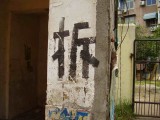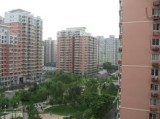 I took a walk this morning near East Lake to eat my breakfast (an egg boiled in tea, a savory bun, and warm soymilk). I sat on a stone wall and watched a fisherman and some grandparents walking with their grandson. I was approached by a reporter from a local TV station, Zhou Zhao of HBTV. She asked me questions about East Lake, which is a large, beautiful lake just a few minutes’ walking distance from my hotel on Wuhan University campus. She told me Hubei Province has more than 1,000 lakes, and that East Lake is one of the biggest. She asked me what I felt about the lake, and a man carrying a camera recorded my answers. I told her I think it is beautiful, that it helps me feel peaceful while I am visiting China. There is a lot of noise and traffic nearby, but the lake is a serene place where you can look out over the water, watch the fishermen, and not feel the pressure of the crowded city. What I didn’t mention is the trash I see along the edges of the lake, the worries I have about the fish caught in it and sold at the market where I buy food in the morning. I assume that all of the water from campus and the surrounding hills and city wash into East Lake, but I don’t know if anyone is testing the water to make sure it’s okay to eat the fish. As I’ve said before, I came to China with an open mind. I understand that they do things differently here. Still, though, I wonder about the condom I saw floating in the duckweed this morning and the styrofoam spilled out onto the road at the top of the hill, which will surely make its way into the lake with the next rainfall.
I took a walk this morning near East Lake to eat my breakfast (an egg boiled in tea, a savory bun, and warm soymilk). I sat on a stone wall and watched a fisherman and some grandparents walking with their grandson. I was approached by a reporter from a local TV station, Zhou Zhao of HBTV. She asked me questions about East Lake, which is a large, beautiful lake just a few minutes’ walking distance from my hotel on Wuhan University campus. She told me Hubei Province has more than 1,000 lakes, and that East Lake is one of the biggest. She asked me what I felt about the lake, and a man carrying a camera recorded my answers. I told her I think it is beautiful, that it helps me feel peaceful while I am visiting China. There is a lot of noise and traffic nearby, but the lake is a serene place where you can look out over the water, watch the fishermen, and not feel the pressure of the crowded city. What I didn’t mention is the trash I see along the edges of the lake, the worries I have about the fish caught in it and sold at the market where I buy food in the morning. I assume that all of the water from campus and the surrounding hills and city wash into East Lake, but I don’t know if anyone is testing the water to make sure it’s okay to eat the fish. As I’ve said before, I came to China with an open mind. I understand that they do things differently here. Still, though, I wonder about the condom I saw floating in the duckweed this morning and the styrofoam spilled out onto the road at the top of the hill, which will surely make its way into the lake with the next rainfall.
I have found new places to buy breakfast since the market where I bought goods last week is being demolished.  “Chai” in Chinese means to tear down, tear open, demolish, or unweave. The buildings are being torn down, the public place of gathering and selling/buying goods demolished; the neighborhood is being torn open, the fabric of relationships created around buying and selling food, of earning money and finding nourishment, unwoven. Sort of. I was upset when I found out this space was being demolished for the celebration of the Wuhan University 120th Anniversary, but already, the local vendors have set up shop in new spaces. They are selling fish and meats and vegetables across the street along a sidewalk between a row of apartments and a soccer field. Others are selling fruits and vegetables along walkways in the shade. None of the street foods are available, only raw produce and meats. Oh, I miss my steamed buns and savory pancakes. Perhaps I will find them along a new sidewalk tomorrow.
“Chai” in Chinese means to tear down, tear open, demolish, or unweave. The buildings are being torn down, the public place of gathering and selling/buying goods demolished; the neighborhood is being torn open, the fabric of relationships created around buying and selling food, of earning money and finding nourishment, unwoven. Sort of. I was upset when I found out this space was being demolished for the celebration of the Wuhan University 120th Anniversary, but already, the local vendors have set up shop in new spaces. They are selling fish and meats and vegetables across the street along a sidewalk between a row of apartments and a soccer field. Others are selling fruits and vegetables along walkways in the shade. None of the street foods are available, only raw produce and meats. Oh, I miss my steamed buns and savory pancakes. Perhaps I will find them along a new sidewalk tomorrow.
 In the books I read before coming to China, the writers all mentioned how quickly modern China is changing. Much of that change has to do with construction. As with the market place, old buildings are torn down and replaced with new structures. Many of the new buildings, though, lack the beauty of the much older buildings. Most of the high-rise apartments currently under construction are plain concrete. They remind me of the Soviet-style apartments I saw when visiting Budapest several years ago. Yes, they have many people to house here in China, but I don’t understand why they have lost their eye for beauty in the construction of all this new housing.
In the books I read before coming to China, the writers all mentioned how quickly modern China is changing. Much of that change has to do with construction. As with the market place, old buildings are torn down and replaced with new structures. Many of the new buildings, though, lack the beauty of the much older buildings. Most of the high-rise apartments currently under construction are plain concrete. They remind me of the Soviet-style apartments I saw when visiting Budapest several years ago. Yes, they have many people to house here in China, but I don’t understand why they have lost their eye for beauty in the construction of all this new housing.
Speaking of construction, I have noticed a difference between Chinese and Americans that I don’t quite understand yet. One of the things I noticed about housing is that people seem to be waiting for something–they don’t fix things on their own or take initiative in cleaning things up. My friend in Nanjing wants to move into a new apartment, but he has to wait for someone to install his appliances, and the waiting period is very long. He told me that when he came to live in the US for a year, he bought a car and got it registered. When the person at the DMV handed him the plates, my friend was surprised. He said that in China, the government takes care of this–they will put the plates on your car for you. When he had to put on his own plates, it was the first time he ever used a screwdriver. I told him about the DIY industry in the US, how there is a huge culture of resourcefulness and self-reliance in the US. Not everyone is like this, of course, but especially in the country and small towns, folks in the US will tend to “git-r-done” when they can. In China, though, people are very resourceful in other ways–they will plant a garden any where there is a little extra dirt.  They’ll sell vegetables and fruits and street food on any available corner. They’ll fix anything you could possibly want repaired at one of the dozens of little mom-and-pop stores along every street. What I don’t know is where the resourcefulness begins and where it ends. Is it older people? Is it poorer people? Do they wait for the government to do some things, but not others? What about the folks in the US who subsist on welfare and public housing? I’m not judging, I’m just wondering why some people rely on an outside source for some things, and others do not. Oh, the questions. Everyone said that traveling would open my eyes to new things about being American, and it’s certainly true.
They’ll sell vegetables and fruits and street food on any available corner. They’ll fix anything you could possibly want repaired at one of the dozens of little mom-and-pop stores along every street. What I don’t know is where the resourcefulness begins and where it ends. Is it older people? Is it poorer people? Do they wait for the government to do some things, but not others? What about the folks in the US who subsist on welfare and public housing? I’m not judging, I’m just wondering why some people rely on an outside source for some things, and others do not. Oh, the questions. Everyone said that traveling would open my eyes to new things about being American, and it’s certainly true.
I promised to write more about the Yellow Crane Tower and the Hubei Provincial Museum. Ugh. I’ve run out of steam. Tomorrow…
I agree with Jeanne one hundred percent! About the garbage around the lake – when I was in Peru a friend of mine would bring a bag with herwhen we were around the water, and would pick up trash and also ask for help from the young people around her. It was something really new for the young folks. Should you try it, I would suggest gloves. Keep enjoying the experiences. Love, Mom
I also love reading these posts — you have a great eye for detail! I’m intrigued by your observations about lack of initiative in the Chinese people; I suspect a large part of that is because their government forces them to be reliant, and frowns (to put it lightly) on doing-it-yourself. But human beings are still human, still individuals, thus the planting of gardens in every little space. People find a way, however they can, to exert humanness.
Letitia,
I think that’s so interesting–your comment about “humanness.” I’m trying to figure out while I’m here in China what I have in common with these people and what I don’t (which is often more obvious), and it’s all so disorienting. This is an interesting way to try to discover what makes us fundamentally human, and what we have learned from those around us. I wish you were here so we could talk about these things face-to-face. You should come next year–I think you would love it here.
love love, love reading this. I want to wake up and read a new entry every day so I feel I’m part of the journey and can continue to learn what you’re experiencing!
Jeanne
Thanks for reading and commenting, Jeanne! It means so much to me. Sometimes I can’t open my email, so these comments are a lifeline. Thanks, Sis :)
Comments are closed.